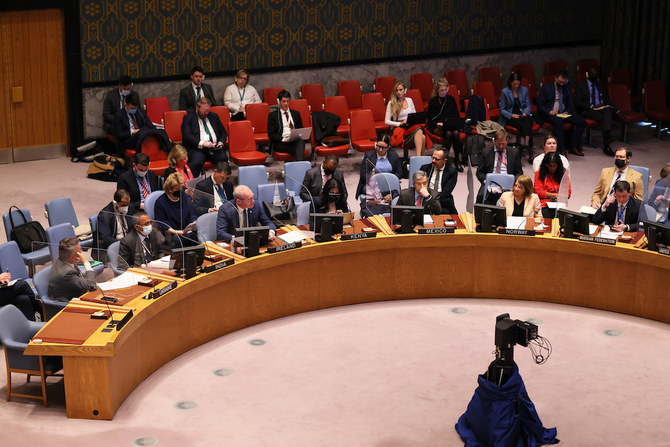NEW YORK CITY: At a recent UN Security Council meeting convened in New York City to discuss the war in Ukraine, delegates noticed something different. On the conference table in front of them, ambassadors had been given plastic water bottles to slake their thirst.
This would not have been noteworthy but for the fact that the UN had decided in 2019 to go plastic-free. A banner erected at the entrance of UN headquarters at the time made the policy quite clear: “No single-use plastic.”
The return of plastics to the Security Council chamber incensed climate-conscious diplomats and visitors, as it appeared to signal the environment had become an afterthought while the war in Ukraine took center stage.
All the bold talk about tackling the climate crisis in recent years seemed to evaporate the moment the war began, leaving behind the distinct impression that the environmental agenda was some kind of luxury issue to be discussed only in peacetime.
Maria Fernanda Espinosa Garces, an Ecuadorian diplomat and former president of the General Assembly, was the driving force behind the elimination of single-use plastics at UN headquarters.
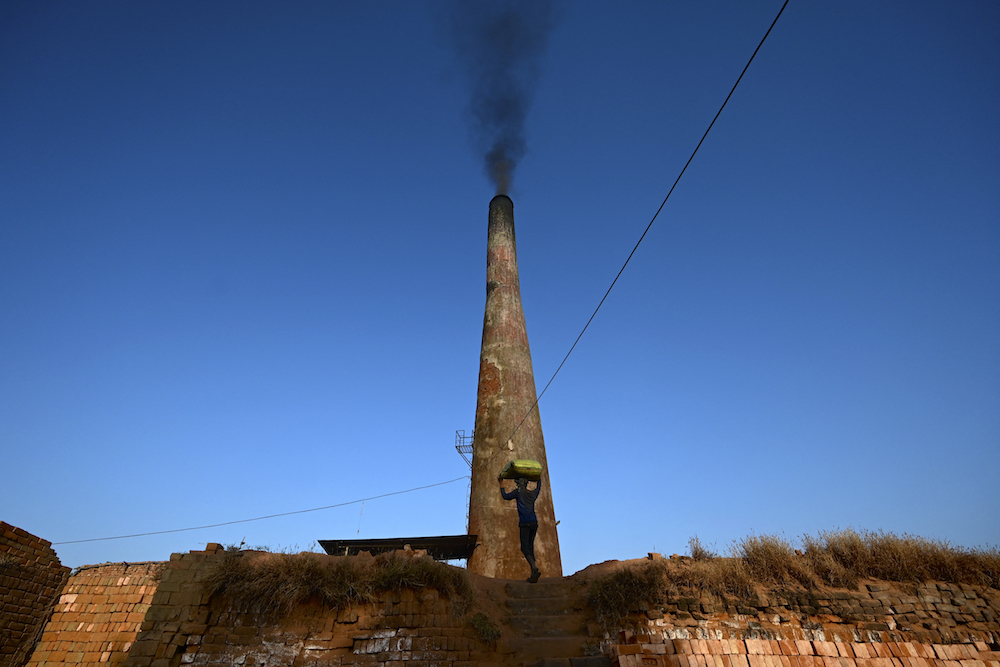
Demand for coal in countries such as India, pictured, has soared amid supply chain shortages and the war in Ukraine. (AFP)
Asked about the apparent backsliding on the issue, Espinosa Garces said that times of crisis were no excuse for abandoning environmental priorities.
“The climate crisis is an existential threat to our human security, and we have a responsibility to make peace with our planet if we want to survive as a species,” she told Arab News. “Climate action should not be left on the back burner, even in times of war.”
She added: “Climate change is killing and displacing millions. It has more global and devastating effects than any war. We have to work on both at the same time.”
Backsliding on established practices is not reserved for the UN’s plastics policy. The war in Ukraine is having a devastating impact on the environment by driving up the extraction and use of fossil fuels.
The soaring price of oil and gas has led the US, Europe and other governments to boost production — at the very moment the world ought to be weaning itself off fossil fuels in favor of clean, renewable sources of energy.
Some critics, particularly those in the US, see the effort to boost supply as a major setback, or even a “betrayal,” of the environmental agenda, dooming the world’s climate goals on reducing carbon emissions to failure.
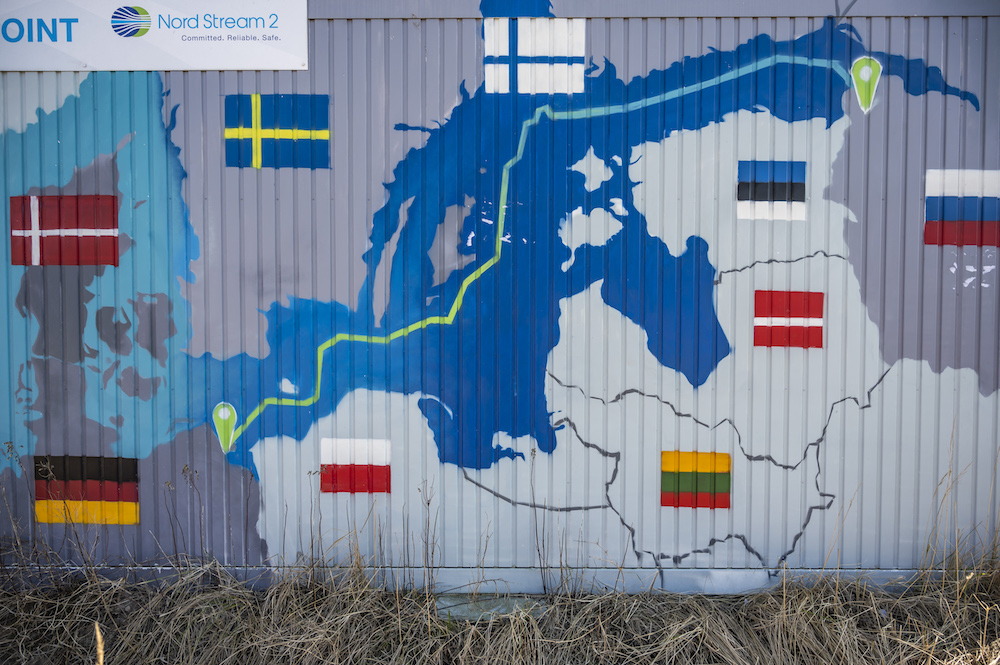
Once defended by then chancellor Angela Merkel as a purely economic project that will bring cheaper gas to Europe, the controversial €10 billion Nord Stream 2 pipeline was finally been canned by Germany over Russia's invasion of Ukraine. (AFP)
With his poll ratings down ahead of November’s midterm elections, US President Joe Biden is under pressure at home to bring down the price of gasoline.
Early on in the Ukraine crisis, he released a record amount of oil from the Strategic Petroleum Reserve and urged oil and gas companies to accelerate drilling operations. Breaking an earlier campaign promise, he also announced he would open more public land to drilling.
In fact, although the US has pledged to cut greenhouse gas emissions in half by 2050, climate change received only scant mention in the State of the Union address of March 1.
This is despite the findings of the latest report by the UN’s Intergovernmental Panel on Climate Change, whose lead author, Heleen De Coninck, said the world had “reached the now or never point of limiting warming to 1.5 degrees Celsius” above pre-industrial levels.
Responding to the IPCC’s latest report, published on April 4, Antonio Guterres, the UN secretary-general, flayed wealthy economies and corporations, saying they “are not just turning a blind eye, they are adding fuel to the flames.

In March, the US released record amounts of oil from reserve in an effort to halt surging fuel prices. (AFP)
“They are choking our planet based on their vested interests and historic investments in fossil fuel,” Guterres added.
On Earth Day, marked each year on April 22, activists held nationwide protests, demanding the US government take concerted action on climate change, including the passage of a new climate bill, which involves some half a trillion dollars-worth of clean energy investments.
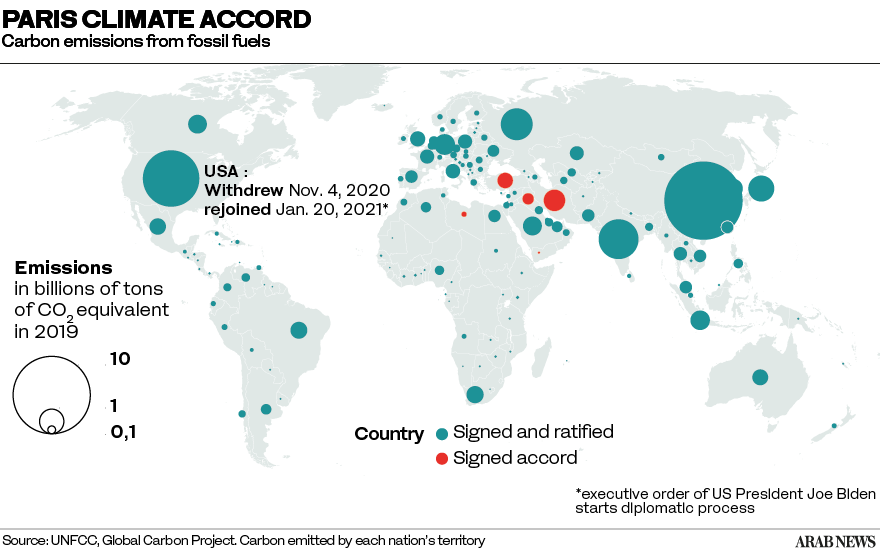
Activists want the Senate to pass the stalled bill as soon as possible as they fear it will never get through Congress if the Democrats lose control of the house in November’s midterms.
Biden’s hands appear to be tied, however, as Republicans in Congress, along with one Democratic senator, Joe Manchin from coal-rich West Virginia, continue to water down and even block the president’s proposals on climate action.
Instead, the priority has become helping Europe to free itself from its dependency on Russian oil and gas, increasing domestic production and releasing reserves to bring down prices for US citizens.
The EU imported about 40 percent of its natural gas, more than one-quarter of its oil and about half of its coal from Russia in 2019.

The US has banned Russian oil imports in response to the continuing invasion of Ukraine. (AFP/File Photo)
In a joint statement with the European Commission on March 24, Biden appeared to have two conflicting goals in mind: To help Europe wean itself off Russian energy, while at the same time keeping a 1.5 degrees Celsius cap on warming “within reach.”
There are also members of Congress who want to “supercharge domestic energy production of all kinds” to provide Europe with energy and “even finance infrastructure for them.” Reconciling these efforts with the world’s climate goals will likely prove to be a bridge too far.

Yet some believe that if Europe succeeds in ending its reliance on Russian energy, it could be a blessing in disguise, offering a golden opportunity for Europe to become fossil fuel-free in the long run.
One school of opinion holds that the war is an opportunity to accelerate the adoption of clean energy technologies. If this proves to be the case, then the war may actually help the continent achieve its climate goals.
Predictably, environmentalists were heartened on Feb. 22 when Germany scrapped its approval for a newly built gas pipeline from Russia. Berlin now plans to import liquefied natural gas from Qatar and the US.
Meanwhile, Belgium is reconsidering its aversion to nuclear power, and Italy, the Netherlands and the UK are all accelerating efforts to install more wind power.
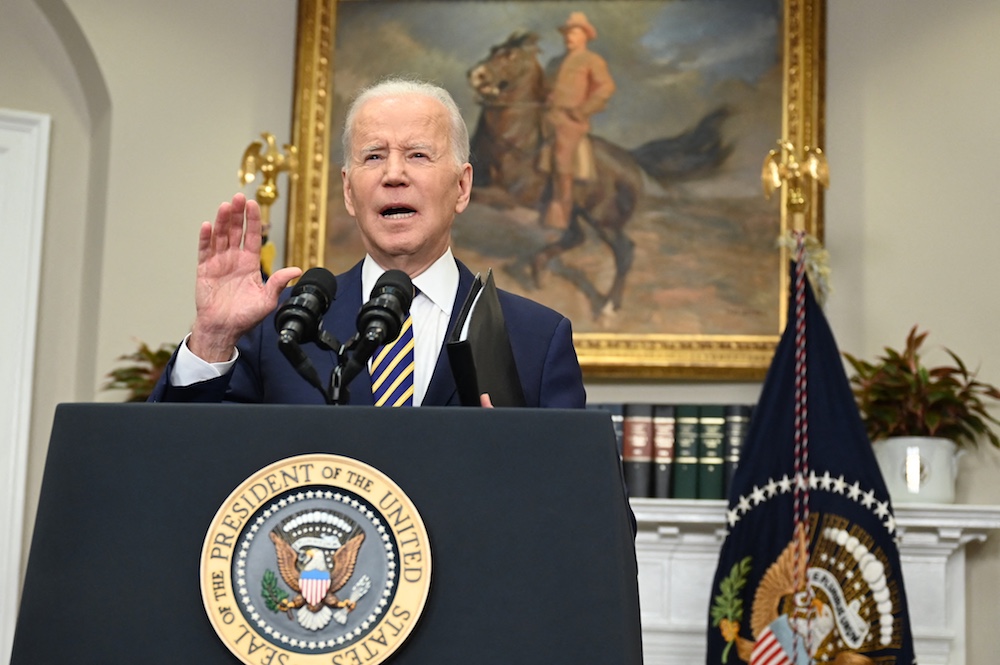
US President Joe Biden’s environmental balancing act will be put to the test during November’s midterm elections. (AFP)
However, efforts to reduce dependence on oil and gas has also created fresh demand for coal — a cheap, easy, though much dirtier alternative — in places that had been in the process of phasing it out.
On March 21, in his first major speech on climate and energy since the COP26 summit in Glasgow last year, Guterres said the rush to use fossil fuels because of the war in Ukraine is “madness” and threatens global climate targets.
Coal must be banished with a full phase-out for richer nations by 2030, and 2040 for all others, including China, he said.
Paradoxically, although the war in Ukraine might speed up Europe’s move away from fossil fuels in the long term, it could slow the clean energy transition — and thereby boost greenhouse gas emissions — elsewhere in the world if coal makes a comeback.
“Countries could become so consumed by the immediate fossil fuel supply gap that they neglect or kneecap policies to cut fossil fuel use,” said Guterres. “This is madness. Addiction to fossil fuels is mutually assured destruction.”
Countries must “accelerate the phase out of coal and all fossil fuels,” and implement a rapid and sustainable energy transition.
It is “the only true pathway to energy security,” he said.


